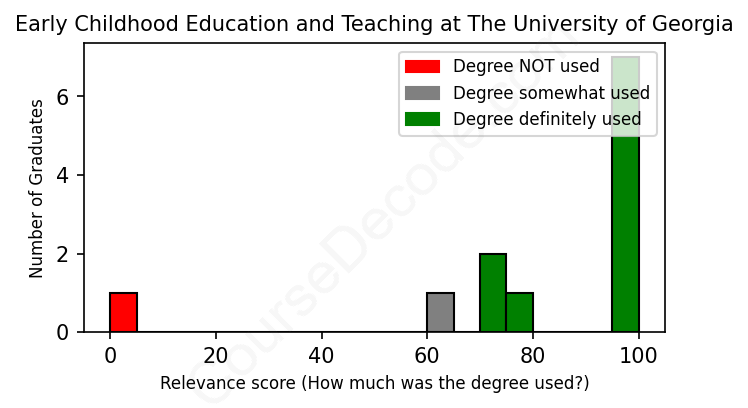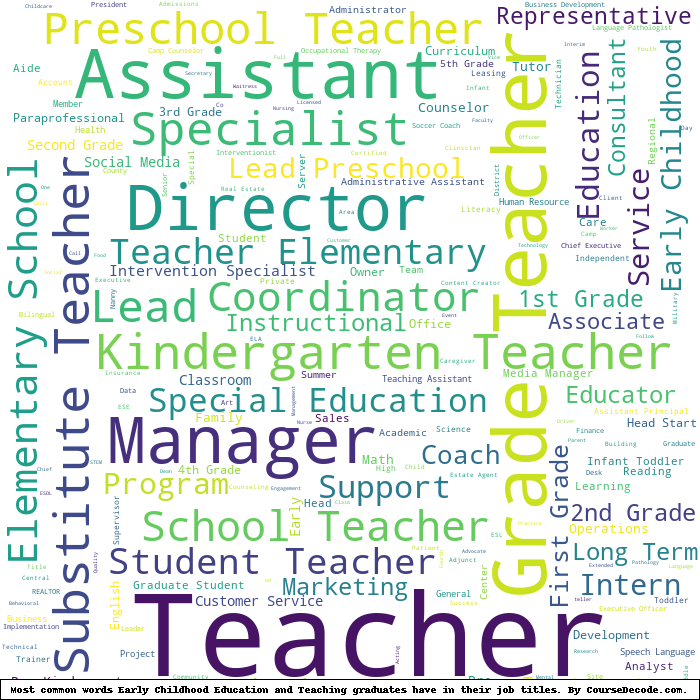
First, some facts. Of the Early Childhood Education and Teaching graduates from The University of Georgia we've analyzed , here's how many have used (or NOT used) their degree in their career:

These are estimates based on AI analysis of 12 LinkedIn profiles (see below).
The verdict? Significantly above average. Overall, with an average relevance score of 81%, Early Childhood Education and Teaching graduates from The University of Georgia have a much higher likelihood (+14%) of finding work in this field compared to the average graduate across all fields:
And for comparison, here's the chart for all profiles we've looked at across all degrees.
Also, after graduating, 58% of these graduates have pursued further education other than another Bachelor's degree (such as a Masters degree or other), compared to the average across all profiles of 35%. This suggests you may need more than just a Bachelors degree to be competitive as a Early Childhood Education and Teaching graduate.
See the details:
|
Relevance score: 100% We think this person has gone into a career highly relevant to their degree. We think this person has gone into a career highly relevant to their degree.
DEGREE INFOGraduated in 2012 from The University of Georgia with a Bachelor of Science (B.S.) in Early Childhood Education and Teaching. Also pursued further education since (see below). JOB HISTORY SINCE GRADUATIONSupply Teacher Pitner Elementary School Aug 2012 - May 2013 Teacher  Compton Elementary School Aug 2013 - Present FURTHER DEGREES DONE SINCE GRADUATINGMaster of Education (M.Ed.)Kennesaw State University 2014 - 2015 ABOUTNo information provided. |
The top 10 most common jobs done by the graduates we've analyzed (ranked most common to least) are:
From the data you provided, it looks like a good chunk of graduates from The University of Georgia with a degree in Early Childhood Education and Teaching have found their way into roles that really connect with their studies. The most common jobs among these alums are various teaching positions, like elementary school teachers, pre-kindergarten teachers, and special education teachers. These roles are definitely relevant because they require the application of teaching methodologies and child development principles, which are central to the degree. You can see a lot of the graduates actually working in public school systems, where their educational background is put to good use in shaping young minds.
However, not all career paths taken by these graduates are directly related to Early Childhood Education. Some made choices to work in administrative roles or jobs in entirely different sectors, like political campaigning or technical support for educational software, which don't really pull from what they learned during their degree program. So, while teaching is a popular and relevant route for many, it's clear that some graduates end up in positions that stray quite a bit from their specialized training. Overall, though, if you’re looking to see how a degree in Early Childhood Education can translate into a career, those teaching roles are a solid place to start!
Here is a visual representation of the most common words in job titles for Early Childhood Education and Teaching graduates (this is across all Early Childhood Education and Teaching graduates we've analyzed, not just those who went to The University of Georgia):

Looking at the career trajectories of graduates from The University of Georgia with degrees in Early Childhood Education and Teaching, it's clear that many of them tend to start their careers as teachers right after graduation. The first jobs often include positions like Pre-K or Elementary School Teacher, and several graduates land roles in school districts fairly quickly, sometimes even during their student teaching periods. For instance, many who graduated between 2010 and 2018 began their teaching careers within just months of completing their degrees. This suggests a strong alignment between their education and their immediate job prospects, which is definitely a positive outcome for new graduates.
Fast forward 5 to 10 years, and while many graduates remain in the education sector, some have explored different paths. A few have transitioned into roles that combine educational expertise with other fields, like technical support or campaign management. However, a notable group seems to have steadily advanced within the educational system, taking on positions like instructional coaches or specialized teachers, which shows potential for career growth. Overall, while some graduates have varied their careers away from direct teaching roles, the majority remain committed to education, which is a good sign for those considering this path. So, if you're thinking about a degree in Early Childhood Education, you'll likely have a solid start and opportunities to evolve in various educational roles over the years!
Getting a Bachelor’s degree in Early Childhood Education and Teaching at The University of Georgia can be a mix of challenging and rewarding. Honestly, it’s not the hardest degree out there, but it does require a genuine passion for working with kids and a good amount of dedication. You’ll dive into subjects like child development, curriculum planning, and educational psychology, so it’s definitely not just playtime! Expect some hands-on experiences and projects that can be time-consuming, but if you love the idea of shaping young minds, you’ll probably find it enjoyable overall. Just stay organized, and you’ll be just fine!
Most commonly, in the LinkedIn profiles we've looked at, it takes people 4 years to finish a Bachelor degree in Early Childhood Education and Teaching.
Looking at these graduates from the University of Georgia, it seems like they’ve mostly found stable jobs, primarily in education, which can be a bit mixed when it comes to salary. Teaching positions, especially in public schools, often start off not paying too well—especially for those who are just beginning their careers. Even with some of them moving into roles like instructional coaching or technical support, which might offer better pay, many have spent a good chunk of their careers in low-paying teacher roles. So, while they might not be rolling in cash, they probably managed to make a decent living overall, especially if they’ve benefited from any promotions or additional roles over time. But if you’re looking for a big paycheck right out of college, education might not be the best bet unless you work your way up!
Here is a visual representation of the most common words seen in the "about" section of LinkedIn profiles who have a Bachelor degree in Early Childhood Education and Teaching (this is across all Early Childhood Education and Teaching graduates we've analyzed, not just those who went to The University of Georgia). This may or may not be useful:

Here are all colleges offering a Bachelor degree in Early Childhood Education and Teaching (ordered by the average relevance score of their Early Childhood Education and Teaching graduates, best to worst) where we have analyzed at least 10 of their graduates:
| College | Score | Count |
|---|---|---|
 Kennesaw State University Kennesaw State University
|
86 | 10 |
 The University of Georgia The University of Georgia
|
81 | 12 |
 Miami University Miami University
|
78 | 16 |
 University of Cincinnati University of Cincinnati
|
77 | 10 |
 Kent State University Kent State University
|
75 | 13 |
 Ashford University Ashford University
|
59 | 39 |